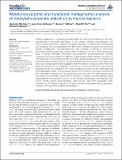Metatranscriptomic and functional metagenomic analysis of methylphosphonate utilization by marine bacteria
Author(s)
Ventouras, Laure-Anne; Wilson, Samuel T.; Karl, David M.; Martinez, Asuncion; DeLong, Edward
DownloadMartinez-2013-Metatranscriptomic a.pdf (2.714Mb)
PUBLISHER_POLICY
Publisher Policy
Article is made available in accordance with the publisher's policy and may be subject to US copyright law. Please refer to the publisher's site for terms of use.
Terms of use
Metadata
Show full item recordAbstract
Aerobic degradation of methylphosphonate (MPn) by marine bacterioplankton has been hypothesized to contribute significantly to the ocean's methane supersaturation, yet little is known about MPn utilization by marine microbes. To identify the microbial taxa and metabolic functions associated with MPn-driven methane production we performed parallel metagenomic, metatranscriptomic, and functional screening of microcosm perturbation experiments using surface water collected in the North Pacific Subtropical Gyre. In nutrient amended microcosms containing MPn, a substrate-driven microbial succession occurred. Initially, the addition of glucose and nitrate resulted in a bloom of Vibrionales and a transcriptional profile dominated by glucose-specific PTS transport and polyhydroxyalkanoate biosynthesis. Transcripts associated with phosphorus (P) acquisition were also overrepresented and suggested that the addition of glucose and nitrate had driven the community to P depletion. At this point, a second community shift occurred characterized by the increase in C-P lyase containing microbes of the Vibrionales and Rhodobacterales orders. Transcripts associated with C-P lyase components were among the most highly expressed at the community level, and only C-P lyase clusters were recovered in a functional screen for MPn utilization, consistent with this pathway being responsible for the majority, if not all, of the methane accumulation we observed. Our results identify specific bacterioplankton taxa that can utilize MPn aerobically under conditions of P limitation using the C-P lyase pathway, and thereby elicit a significant increase in the dissolved methane concentration.
Date issued
2013-11Department
Massachusetts Institute of Technology. Department of Biological Engineering; Massachusetts Institute of Technology. Department of Civil and Environmental EngineeringJournal
Frontiers in Microbiology
Publisher
Frontiers Research Foundation
Citation
Martinez, Asuncion, Laure-Anne Ventouras, Samuel T. Wilson, David M. Karl, and Edward F. DeLong. “Metatranscriptomic and Functional Metagenomic Analysis of Methylphosphonate Utilization by Marine Bacteria.” Frontiers in Microbiology 4 (2013).
Version: Final published version
ISSN
1664-302X